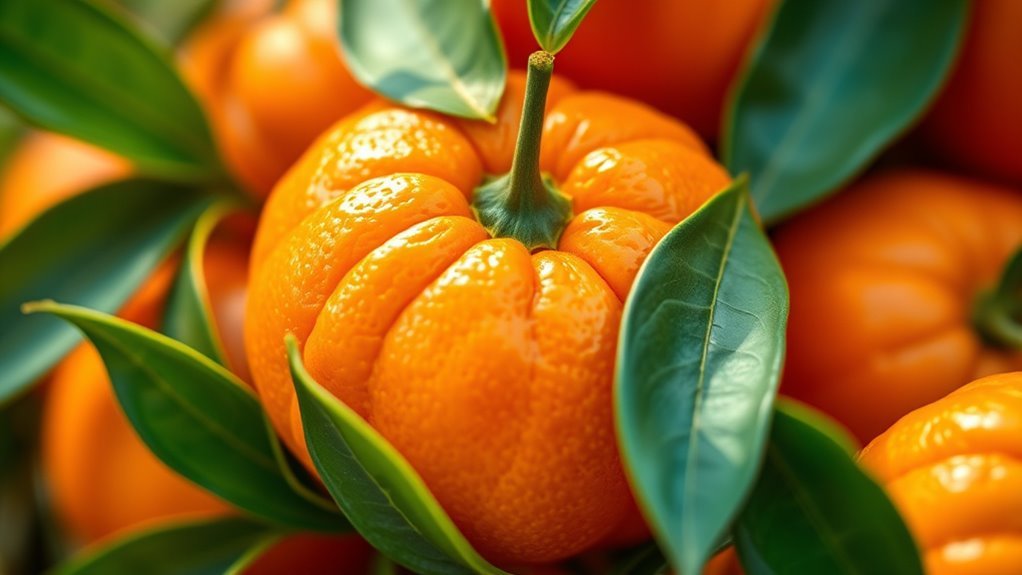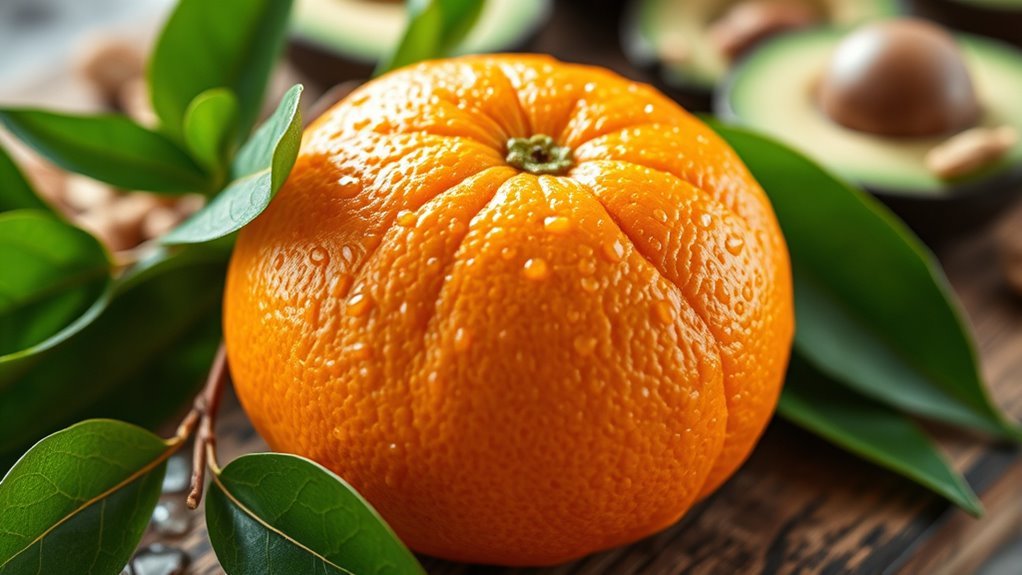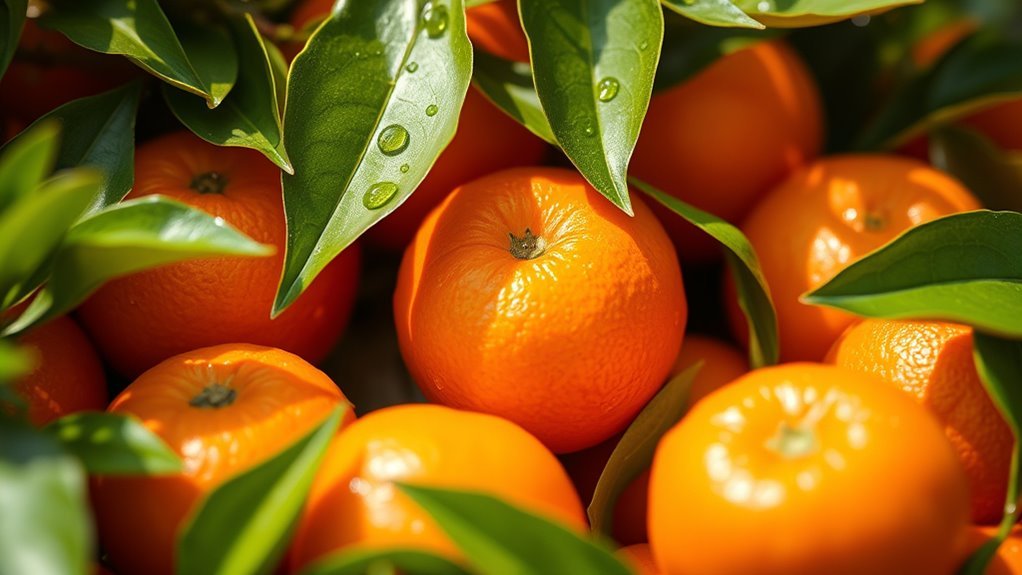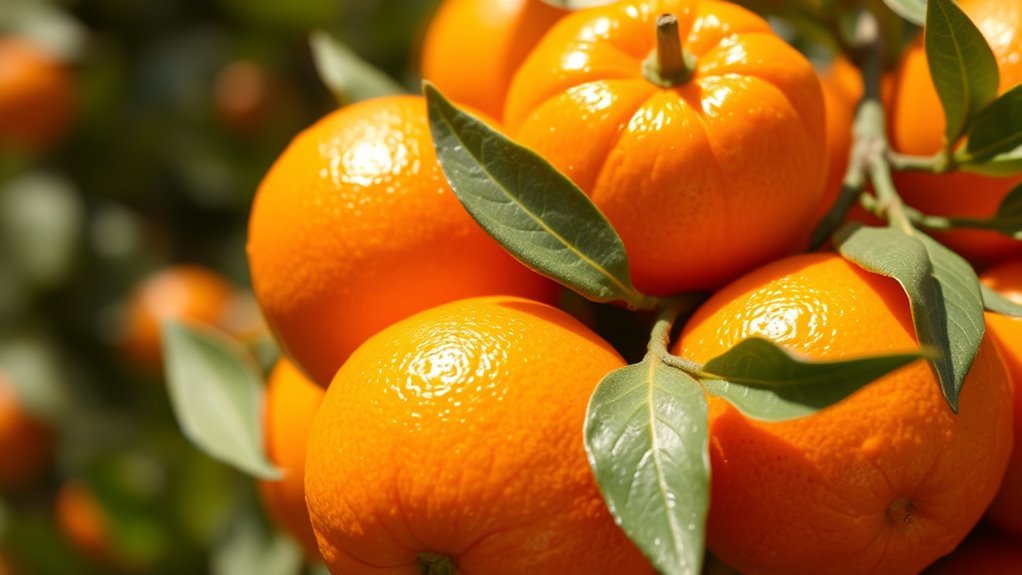Mandarin oranges can fit into a keto diet, but you’ll need to enjoy them in moderation. Each medium mandarin has about 9 grams of sugar and 13 grams of carbohydrates. While they offer great health benefits, like high vitamin C and antioxidants, it’s essential to keep track of your carb intake. Adding them to salads or pairing with nut butter can satisfy your cravings without exceeding your limits. You’ll find more tips on balancing fruits in your meal plan.
Nutritional Profile of Mandarin Oranges

When it comes to the nutritional profile of mandarin oranges, you’ll find a delightful combination of vitamins, minerals, and antioxidants. Different mandarin varieties, like Satsuma and Clementine, offer unique flavors and benefits but share a rich vitamin content. These fruits are particularly high in vitamin C, which supports your immune system and skin health. Additionally, they contain vitamin A and several B vitamins, contributing to overall wellness. The minerals found in mandarins, such as potassium and magnesium, promote heart health and muscle function. Antioxidants in these fruits help combat oxidative stress, making them a nutritious choice. Enjoying mandarin oranges can be a invigorating way to incorporate essential nutrients into your diet while embracing a balanced lifestyle.
Sugar Content and Carbohydrate Counts

Mandarin oranges, while packed with vitamins and minerals, also contain natural sugars that can impact your carbohydrate intake. Understanding their sugar content and carbohydrate counts is vital if you’re following a keto diet. Here are some key points to take into account:
- Sugar Content: Mandarin oranges have about 9 grams of sugar per medium fruit, which can add up quickly.
- Carbohydrate Counts: A medium mandarin contains roughly 13 grams of carbohydrates, making them a potential concern for strict keto dieters.
- Serving Size: Moderation is essential; enjoying one mandarin might fit into your daily carb limit, but more can push you over.
Being aware of these factors helps you make informed choices while enjoying the deliciousness of mandarins without compromising your keto goals.
Health Benefits of Mandarin Oranges

Packed with essential nutrients, mandarin oranges offer several health benefits that can enhance your overall well-being. These vibrant fruits are loaded with vitamin C, which plays an important role in immune support. By incorporating mandarin oranges into your diet, you may boost your body’s defenses against illness and infection. Additionally, they contain antioxidants that help combat oxidative stress and inflammation, promoting better overall health. Their fiber content also aids digestion and helps maintain a healthy weight. With their low-calorie profile, mandarin oranges are a delicious way to satisfy your sweet tooth without compromising your health goals. So, whether you enjoy them as a snack or add them to meals, the health benefits of mandarin oranges are hard to ignore.
Incorporating Mandarin Oranges Into a Keto Meal Plan
Although following a keto diet typically involves limiting carbohydrate intake, you can still enjoy mandarin oranges in moderation. Incorporating them into your meal prep can add a burst of flavor and nutrients without derailing your goals. Here are three ways to include mandarin oranges in your keto recipes:
- Salads: Toss segments into spinach or mixed greens for a revitalizing crunch.
- Snacks: Pair a few mandarin slices with almond butter for a satisfying treat.
- Sauces: Blend them into a low-carb dressing or marinade to elevate your dishes.
Alternative Low-Carb Fruits to Consider
If you’re looking to diversify your fruit intake while sticking to a low-carb diet, there are plenty of options that can satisfy your cravings without compromising your goals. Consider incorporating these low-carb fruits into your meals:
| Fruit Type | Carb Content (per 100g) |
|---|---|
| Low Carb Berries | |
| Raspberries | 5.5g |
| Strawberries | 7.7g |
| Keto Friendly Melons | |
| Cantaloupe | 7.9g |
| Watermelon | 7.5g |
These fruits provide essential nutrients and antioxidants while keeping your carb intake in check. Enjoy them fresh, blended into smoothies, or as toppings for keto-friendly desserts. Embrace your freedom to explore these delicious alternatives!
Frequently Asked Questions
Can I Eat Mandarin Oranges on a Strict Keto Diet?
If you’re on a strict keto diet, you might want to be cautious with mandarin oranges. While they’re delicious, they can be higher in carbs than other fruit alternatives. Following keto guidelines, it’s essential to keep your daily carb intake low, and fruits can quickly add up. Consider options like berries that are lower in carbs if you want to satisfy your sweet tooth while staying within your keto goals.
Are Mandarin Oranges Suitable for Diabetes Management?
Imagine traversing a garden where each fruit tells a story. Mandarin oranges, with their vibrant hue, are sweet yet cautious companions in diabetes management. While they can elevate your blood sugar temporarily, their fiber content helps temper that rise. If you savor them in moderation, you can enjoy their zest without compromising your health. Always listen to your body’s signals, and consult with a healthcare professional to find the right balance for you.
How Do Mandarin Oranges Compare to Other Citrus Fruits?
When you compare mandarin oranges to other citrus fruits, you’ll notice distinct flavor profiles and citrus nutrition variations. Mandarins are sweeter and less acidic than lemons or grapefruits, making them a favorite for snacking. They also provide a good source of vitamin C and fiber, similar to other citrus fruits, but with fewer calories. Overall, including a variety of citrus can enhance your diet, offering diverse tastes and health benefits.
What Is the Best Way to Store Mandarin Oranges?
When it comes to mandarin orange preservation, the best way to store them is in a cool, dry place. Ideally, you should keep them in the refrigerator, where ideal storage conditions can extend their freshness for up to two weeks. Avoid sealing them in plastic bags, as moisture can lead to spoilage. Instead, place them in a breathable mesh bag or a crisper drawer to allow air circulation while maintaining their delightful flavor and texture.
Are There Any Potential Allergies Related to Mandarin Oranges?
When it comes to mandarin orange allergies, some folks may experience reactions due to citrus fruit sensitivities. Symptoms can range from mild skin irritations to more severe respiratory issues. If you suspect you’re allergic, it’s best to consult with a healthcare professional for proper testing and advice. Remember, while mandarin oranges are delicious, they can trigger allergies in sensitive individuals, so always listen to your body and pay attention to any adverse reactions.
1. Are Mandarin oranges keto-friendly?
Mandarin oranges can be included in a keto diet, but in moderation. They contain natural sugars and carbohydrates, which can impact your daily carb intake. A typical serving of mandarin oranges (about 100 grams) contains approximately 9 grams of carbs, which may take up a significant portion of your daily carbohydrate allowance on a strict keto diet. Therefore, it’s important to monitor your portions carefully if you choose to include them.
2. How many carbs are in one mandarin orange?
One medium-sized mandarin orange (about 88 grams) contains roughly 8 to 10 grams of carbohydrates, with around 1.5 to 2 grams of fiber. Since fiber is not fully digestible and can be subtracted from total carb content in many diets, the net carbs would be around 6 to 8 grams. This makes mandarins relatively higher in carbs compared to other keto-friendly fruits like berries.
3. What are the health benefits of mandarin oranges?
Mandarin oranges are rich in vitamin C, antioxidants, and various phytochemicals, which can boost your immune system and promote overall health. They also contain potassium, which helps regulate blood pressure, and fiber, which aids in digestion. While they are sweet and refreshing, it’s essential to balance their intake with your daily carb goals, especially on a keto diet.
4. Can I eat mandarin oranges on a lazy keto diet?
Yes, you can enjoy mandarin oranges on a lazy keto diet, which typically allows for more flexibility with carbohydrate intake. If you are not strictly limiting your carbs and are instead focusing on overall low-carb eating, a small serving of mandarin oranges can fit into your meal plan. Just be mindful of the total carbohydrate count for the day to ensure you stay within your desired range.
5. What are some keto-friendly alternatives to mandarin oranges?
If you’re looking for keto-friendly fruit alternatives to mandarin oranges, consider options like berries (strawberries, raspberries, and blackberries) as they are lower in sugar and carbs. Avocado is another excellent choice, offering healthy fats and minimal carbs. Additionally, cucumbers and bell peppers can provide a refreshing crunch and are very low in carbs, making them suitable for a keto diet.
References
- https://www.healthline.com/nutrition/mandarin-oranges-keto
- https://www.ncbi.nlm.nih.gov/pmc/articles/PMC6460134/
- https://www.fda.gov/food/food-labeling-nutrition/food-data-central
- https://www.webmd.com/diet/what-is-the-keto-diet
- https://www.hsph.harvard.edu/nutritionsource/carbohydrates/
- https://www.ncbi.nlm.nih.gov/pmc/articles/PMC7356847/
- https://www.cdc.gov/nutrition/index.html
- https://www.sciencedirect.com/science/article/pii/S2212267217300441
- https://www.who.int/news-room/fact-sheets/detail/healthy-diet


